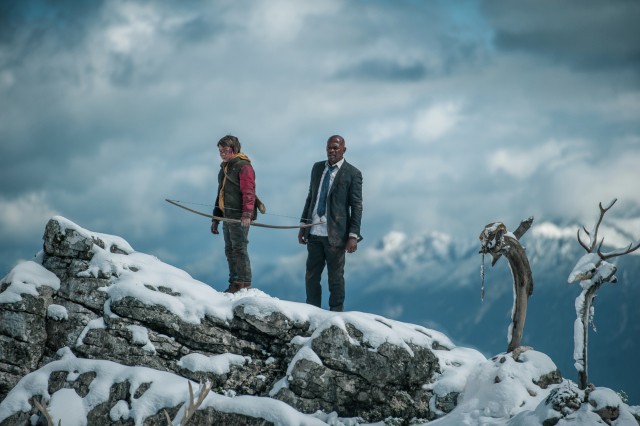
Big Game (2014, directed by Jalmari Helander)
A few years ago, I missed a little film at TIFF called RARE EXPORTS, about a group of Finnish hunters trying to bag a rogue Santa Claus. I was roundly scolded by everyone I knew who did see it, so when the director, Jalmari Helander, had a film show up on this year's Midnight Madness program I promised myself I wouldn't make the same mistake twice.
It's nice to be rewarded for good decision-making.
In northern Finland, 13-year-old Oskari prepares to prove his ascent into manhood by spending a night and a day alone in the forest and bringing back a kill that he brought down using only a bow and arrow. It's a time-honored tradition in his village, and his father is something of a legend for bagging a bear during his own rite of passage, but despite all his efforts and training Oskari seems ill-equipped to succeed. His deer call is a bit suspect no matter how proud of it he is, and he can't even fully pull the bow he's supposed to wield. His father, not wanting his son to disgrace himself, secretly slips him a map with a particularly bountiful hunting spot marked on it.
Meanwhile, above their heads, Air Force One is en route to a summit in Helsinki. President Bill Moore (Samuel L Jackson, naturally) is down in the polls and his final months in office seem destined to be the lamest of lame ducks. The head of his Secret Service detail (Ray Stevenson), who's already taken a bullet for him once, tells him not to worry so much. Then all hell breaks loose. A missile lock is detected from below them, the plane's counter-measures turn out to have been sabotaged, and Moore has no choice but to strap in to an escape pod and jettison down to the tundra.
Let the hunt begin.
BIG GAME is a throw-back to a simpler, more ridiculous time in filmmaking (one that's going to be highlighted in no-doubt spectacular fashion a few nights from now in Mark Hartley's ELECTRIC BOOGALOO: THE WILD, UNTOLD STORY OF CANNON FILMS). The Amblin comparisons are inevitable given Oskari's age, but to me the film felt a lot closer in spirit (if not quite execution) to early John Carpenter. A plot device like having the President downed in hostile territory obviously recalls ESCAPE FROM NEW YORK, but you can see faint echoes of ASSAULT ON PRECINCT 13 and even THE THING in the premise. There are other little winks and nods to classic 80s action flicks as well, such as the fact that the President has to leave Air Force One missing a shoe. BIG GAME isn't a homage by any means though. It's very much it's own thing, but Helander isn't afraid to let his influences show.
The adult cast knows what kind of ride they've signed up for and embraces it. You know what you can expect from Samuel L, but when you stack your supporting cast with the likes of Stevenson and Victor Garber you know at least one of them is going to turn out to be a bad guy. Jim Broadbent also shows up as an old CIA terrorism expert called out of retirement to try and out-think the enemy, and Ted Levine chews every piece of scenery he can get his hands on as the general in charge of the Pentagon's rescue efforts. Felicity Huffman also works into the mix, but sadly she barely gets used. The most surprising performance is handed in by young Onni Tommila as Oskari, who matches Jackson beat for beat. His evolution from nervous young lad to squinty-eyed semi-bad-ass who delivers one-liners worthy of an Arnie flick is hilarious and as believable as anything in this not-at-all-believable film. Tommila's work is what keeps the film even slightly grounded, and allows the more absurd elements and characters the freedom to aim for the sky.
BIG GAME is just big stupid fun. Some of the big stupid fun elements work better than others (the painfully expository dialogue between Jackson and Stevenson at the beginning of the film had me worried I'd accidentally stumbled into a screening of The Asylum's SHARKS ON A PLANE) but by the time the President proves his identity to Oskari by handing him a passport clearly labeled 'President of the United States of America' under his name, the movie has found its wacky Finnish rhythm. I'd only recommend seeing this film if you like grinning a lot.

Force Majeure (2014, directed by Ruben Ostlund)
Humanity, when you get right down to it, is a social animal that tries to use the former to obscure the latter. The unwritten rulebook on how we treat and interact with other people isn't there to protect them; it's there to shield ourselves from our own true natures. When that mask slips and the rules are forgotten, whether it's in a post-apocalyptic wasteland or a Victorian drawing room, the results can be shattering.
Tomas and Ebba are a Swedish couple on a skiing holiday in the French Alps with their daughter and son. He's a bit of a workaholic and they're somewhat hopelessly bourgeois, but for the most part they have a good marriage and a happy family. One day, early in their vacation, while enjoying a spectacular rooftop view of the mountains over lunch, a small avalanche starts creeping towards their lodge. Tomas reassures everyone that it's a controlled avalanche and there's nothing to worry about, but when the onrushing snow seems to threaten to sweep over them he suddenly bolts inside, leaving his wife and child to hide under the table. It proves to be a false alarm, and no one was in any real danger, but both he and Ebba find themselves disturbed by his instinctual reaction. Gradually, his refusal to acknowledge what happened crashes down and buried their illusions of trust and happiness.
Sounds heavy, doesn't it? Don't be fooled. Ostlund's got a light, deft touch, and he's not telling this story to condemn humanity but to embrace it. FORCE MAJEURE juggles its satirical and serious elements brilliantly, not looking down on its subjects the way, say, Haneke does, but simply at them, with eyes and heart open. Ebba and Tomas' troubles spill over to Tomas' friend Mats and his younger girlfriend Fanni after Mats tries to have his buddy's back during a particularly tense dinner, and they end up having one of those ridiculous, exhausting, barely-coherent three am conversations that you can never quite remember how they got started or what the point was, but they still leave you with a bitter aftertaste in the morning. It's note-perfect character moments like that, when everyone gets their turn at just being so damned human, that really drive the film forward. Even Tomas' eventual breakdown, when he confesses all his sins and lays bare his self-loathing before finally just retreating into continuous child-like sobbing, is such an inspired blend of tragedy and comedy that all I could do was sit in awe. Cast, script, cinematography and direction are all in harmony here, all working together at an incredibly high level, and there's not a moment of the movie that doesn't feel like it couldn't have been taken from life.
By the end of the film, when the family dynamics have returned more or less to equilibrium, I was reminded of one of the truest observation on human nature ever written.
If you've only ever seen the Huston/Bogart film version of The Maltese Falcon, it's basically a perfect adaptation of Dashiell Hammett's book with one glaring omission: the Flitcraft story. In the book, Spade tells Bridget a story, just to pass the time, about an old case of his involving a man named Flitcraft, who had disappeared. He eventually found the man alive and well and living up in the northwest (Seattle or Portland or some such), and Flitcraft told Spade an incredible story about walking home from work one day when a girder from a construction site fell and hit the ground inches away from him. The near-death experience shook him to his core, and he just up and left his wife and kids without a word and hopped on the first bus leaving town. The thing about it though, Spade said, is that while Flitcraft had changed his name and changed his location, he hadn't really changed himself. His new life was basically the same as his old one: same kind of job, same kind of house, same kind of wife, and Flitcraft didn't even seem to have realized it. Like Tomas, his mask had slipped and instinct had taken over, but even that brief glimpse of who he was beneath the mask was unbearable, and he'd done all he could to put it back into place.
Hammett (through Spade) didn't judge Flitcraft harshly, and neither does Ostlund judge his subjects. FORCE MAJEURE is a comment on human nature, not a criticism, and it's as insightful a comment as anything you're likely to see on screen any time soon.
Follow me, and give me audience friends. Cassius, go you onto Twitter. @AntonSirius
